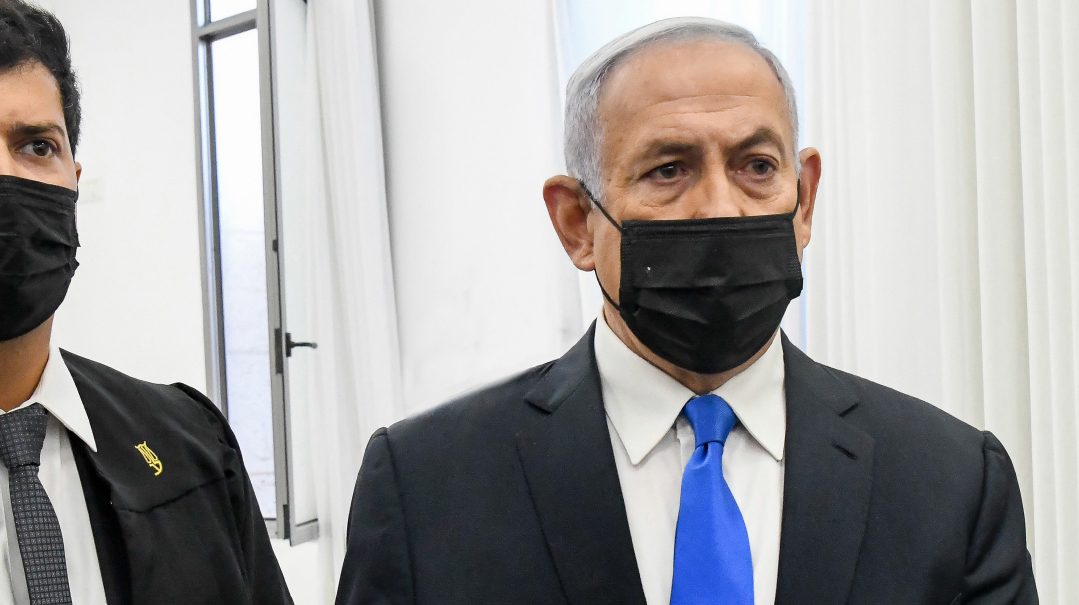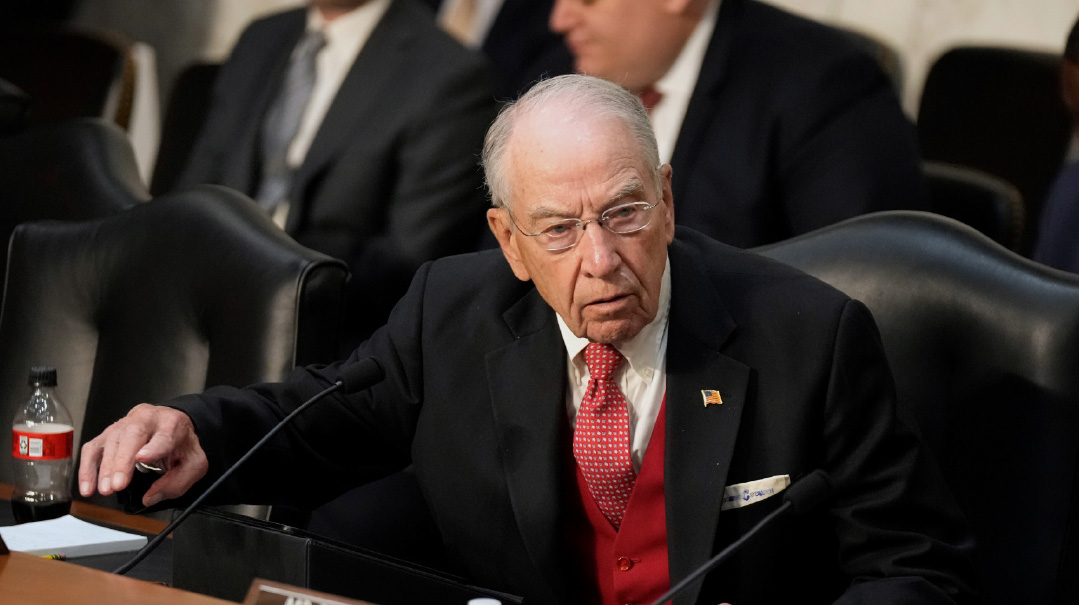Inside Bibi’s Trial

Contrary to all the hype, Ilan Yeshua’s testimony did not, in fact, directly implicate Netanyahu

On Monday last week, Israel registered a moment of split-screen drama as Bibi Netanyahu appeared in court for the evidentiary phase of his trial for the so-called Case 4000, even as the country teetered on the edge of fifth elections.
After countless postponements and interim decisions, Ilan Yeshua, former CEO of the Walla news site, took the witness stand at the Jerusalem district court and testified that the site became a tool in the hands of its owners — Shaul and Iris Elovitch — to curry favor with Prime Minister Binyamin Netanyahu. After only a few days, the defense’s strategy became clear: stalling Yeshua’s testimony with a series of objections, mainly about the way the prosecution had prepared him for his appearance in court.
Room 315, where the trial is being held, was redesigned for the trial, combining two courtrooms into one. Entry is nevertheless restricted due to coronavirus guidelines. Journalists watched on the first floor through live broadcasts, and only two per day — agreed upon by rotation — can be physically present in court.
Netanyahu was required to be present only for the trial’s opening. Only a few days had passed since the election, and the president had not yet decided whom to task with the formation of the next government — but for the judges, this had no bearing on the legal proceedings.
As Bibi walked into court, a dueling narrative played out in the capital. Not far away, delegations from Israel’s political parties were trooping into the president’s residence to recommend a candidate for prime minister. And it was Netanyahu who won the most recommendations.
So, while the prosecutors see Netanyahu as guilty of disqualifying criminal behavior, some two million Israeli voters have full confidence in him and see him as the best man to serve as prime minister. That, according to Bibi’s supporters, is the real story of the Netanyahu trial — a power struggle between rule by the people and rule by bureaucrats.
In a half-hour-long opening speech that Netanyahu was obliged to attend, lead prosecutor Liat Ben Ari accused the prime minister of using “the immense power of his office” to further his “personal desires.”
“The case before the honorable court today is a serious and important case in the field of governmental corruption,” Ben Ari told the judges. “The relationship between Netanyahu and the [Elovitches] was built on mutual interests, between a public servant filling the highest executive and legislative roles, and the owners of a news network whom he has the power to advance financially, should they fulfill his demands.”
Ben Ari argued: “For [Netanyahu], the benefit received was invaluable, in the most literal sense of the term — something that no money could buy, personally, politically and publicly. For [the Elovitches] it was a commodity to be sold in exchange for a business return. A commodity like any other — money, material benefits, appointments. A commodity holding the power to skew the judgment of a public servant. It is, therefore, a bribe.”
Meanwhile Prime Minister Netanyahu’s body language betrayed indifference. He was silent, still, emotionless, showing little to no interest in what was going on around him. Physically he was in the Jerusalem district court, but his head was in the president’s residence — where, a day later, the decision was made to tap him with forming Israel’s next government.
As soon as the lead prosecutor finished, Netanyahu left the building. The judges had exempted him from being present during the testimony of the prosecution’s first witness — Ilan Yeshua, who described at length, on three different days last week and again this week, how he was required to skew the Walla news site’s coverage in favor of Netanyahu. This was a quid pro quo; Walla’s owners, Shaul and Iris Elovitch, wanted to receive regulatory benefits for another of their holdings, the Bezeq communications company.
On the face of it, this is the most severe of the three cases. The prosecution’s decision to open the trial with Yeshua’s evidence shows that it’s bringing out the big guns right at the beginning. Yeshua recounted that not only was he required to provide favorable coverage of the prime minister, but also negative coverage of his rivals. In his words: “Until Walla became a private company in 2012, I saw nothing out of the ordinary. But after the company was revamped in 2012, we started getting instructions from above about publishing certain articles, changing the tone of others, or taking some articles down faster. Requests that infringed on my role as editor.”
When Yeshua was asked whom the requests pertained to, he replied: “The prime minister and his wife, mostly. Sometimes also the son [Yair Netanyahu].”
Amid a thicket of media industry terms, the judges were forced to ask for clarification. On Wednesday, for example, Yeshua recounted how he had reported to Elovitch that a certain article had been put up “as an appetizer.” In the site’s insider lingo, “appetizers” are articles posted as clickbait on the site’s homepage, right under the main headline.
To ensure that the explanation had been understood, the legal teams requested to open Walla’s homepage on the big screen in the hall. The tension gave way to a moment of laughter when Yeshua showed the judges the current appetizer article, touting his own testimony.
In addition to removing negative articles about Netanyahu, Yeshua recounted that he had been forced to put out negative articles about Netanyahu’s political rivals, specifically Naftali Bennett. He recounted a demand to post “a whole series of article against Bennett, including against his wife and father.”
The defense legal team charged that during the prosecution’s preparation of its case, Ilan Yeshua had been shown more materials than he was supposed to see, compromising his evidence. That led to a testy exchange between Netanyahu’s lawyers and a judge.
Attorney Boaz Ben Zur from Netanyahu’s defense team addressed Yeshua, saying, “When you say, ‘We were required,’ don’t leave that in the royal plural…”
Judge Friedman-Feldman interjected, “Attorney Ben Zur.”
Ben Zur replied, “Yes, your honor.”
“You’re not cross-examining now,” instructed the judge.
“No, no, your honor,” assured Ben Zur. “There will be a cross-examination in a few months.”
Friedman-Feldman reprimanded him: “First of all, it’s not ‘No, no.’ Counsel will not say ‘no, no’ to me. We’re in the initial examination now, the prosecution is handling the charges as it thinks best. Instead of interrupting, you should be taking notes for the cross-examination stage.”
Boaz Ben Zur and his colleague Jacques Chen continued to interfere, much to the dismay of prosecutor Yehudit Tirosh. They objected, quibbled, charged that Yeshua was introducing new facts that hadn’t emerged during his police testimony, and disrupted his testimony repeatedly.
When Yeshua recounted that he had been asked to prepare an article stating that Bennett’s wife had worked in a non-kosher restaurant, Ben Zur jumped up to point out that he hadn’t raised that incident during his police testimony, and hinted that there was a reason Yeshua was bringing it up now: “We all know Bennett will be at the president’s house on a very specific errand today — but that’s okay.”
Contrary to all the hype, Yeshua’s testimony did not, in fact, directly implicate Netanyahu, nor did it firmly establish the type of “quid pro quo” connection required for a bribery conviction. Most of his evidence was nothing but hearsay or hints he received from his superiors; he never had direct contact with Netanyahu’s office.
The court brushed aside the defense’s objections to the prosecution’s preparatory process. There is a basic rule in a criminal trial that the prosecution is not permitted to surprise the defense with new facts that it hasn’t heard yet. This is also the reason all of the investigation materials are supposed to be handed over to the defense — to give it time to properly prepare. The prosecution countered that the issues were covered in the police investigation’s transcripts, even if Yeshua hadn’t been asked about them directly, and that his testimony on those specific instances were completely in accord with the general pattern of Walla’s biased coverage that Yeshua had described in detail to the police. Of the three judges, Moshe Bar Am seemed the most inclined to hear the defense’s arguments, and he even pondered aloud whether it wouldn’t be wise to require a repeat investigation.
Attorney Avigdor Feldman, one of Israel’s longest-serving criminal lawyers, told Mishpacha, “The defense’s complaint is very understandable as, on the face of it, Yeshua was an active party to any criminal activities that occurred. The defense’s motivation in this case is to show that Yeshua’s evidence is biased in favor of the prosecution in return for charges not being pressed against him. The defense is seeking to establish the untrustworthiness of this particular witness, and the need for additional proof.”
Although the judges didn’t disqualify the former Walla editor’s testimony — ruling that even if Yeshua had added some new facts that weren’t in his police testimony, none of them were of sufficient weight to significantly harm the defense’s prospects — Netanyahu’s lawyers won one concession. The court instructed the prosecution to focus on evidence that did come up during the police investigation.
But going forward, says Avigdor Feldman, Netanyahu’s defense attorneys’ claim that the investigation against him was opened before the requisite approval was obtained from the attorney general is Bibi’s most powerful argument. “That could be a dramatic opening. Usually when cases are thrown out of court, it’s on procedural grounds, not because the defendant is found innocent.”
Given the political implications of the trial and the massive amount of evidence, says Feldman, the trial will probably take about two years. “Even the very question of whether favorable coverage answers the definition of bribery is something that will take a long time to be decided.”
But after just a week of rearguard action by Netanyahu’s lawyers, the prosecution was sufficiently worn down to demand, “Can we have enough of this kindergarten?”
To which Bibi’s lawyer Ben Zur replied: “This kindergarten will be studied in university.”
(Originally featured in Mishpacha, Issue 856)
Oops! We could not locate your form.













